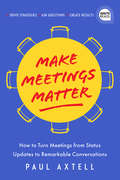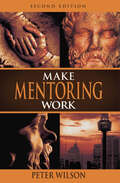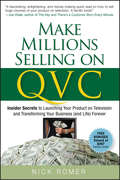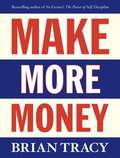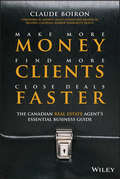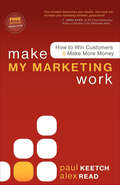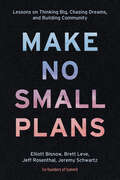- Table View
- List View
Make Me Tremble (Make Me)
by Beth KeryFrom the New York Times bestselling author of Because You Are Mine and The Affair, comes Make Me - a tantalizing serial novel about hidden pasts, dangerous obsessions, and uncontrollable passion, perfect for fans of E. L. James, Sylvia Day, Jodi Ellen Malpas and J. Kenner. When Jacob Latimer ran into Harper McFadden on the beach, she thought it was the first time their paths had crossed. Only Jacob knows that his murky history connects with hers in ways she couldn't imagine - ways that make their relationship dangerous. He should let her go. But now that he's felt her in his arms, he worries that he'll never be able to forsake her... Harper has never been this attracted to anyone before - nor has she ever been so intimidated. Jacob can go from aloof and mysterious to total mastery of her mind and body in a second flat. In the glamorous setting of his luxurious yacht, he finally stakes his claim. And he won't stop until he has every inch of her under his delicious control...Don't miss the next instalment, Make Me Say It...Includes a bonus excerpt of Beth Kery's Glow.Discover the other captivating titles by Beth Kery: The Affair, the One Night of Passion series, and her bestselling erotically charged series which began with Because You Are Mine.
Make Me: Complete Novel (Make Me)
by Beth KeryFor fans of E. L. James, Sylvia Day, Jodi Ellen Malpas, J. Kenner and Maya Banks. From the New York Times bestselling author of The Affair and the Because You Are Mine series, Make Me explores hidden pasts, dangerous obsessions, and uncontrollable passion... Harper McFadden established herself as an investigative journalist by being both compassionate and fearless. After tragedy strikes her family, she moves to the shores of Lake Tahoe to find some peace. But when mysterious software mogul Jacob Latimer enters her life, her thoughts turn from her own healing to an insatiable desire to get closer to him...No one knows what secrets lurk in the past of Jacob Latimer. He built his corporation from nothing, but rumors abound about his mysterious rise to power. Harper is the last person he should let into his life. She could expose the truth about his origins. But Jacob knows things about Harper's past that draw him in. He wants nothing more than to make her his - and Jacob is a man who always gets what he wants...For more electrifying romance, don't miss the other captivating titles by Beth Kery, The Affair, Glimmer, Glow, the One Night of Passion series, and her bestselling erotically charged series which began with Because You Are Mine.
Make Meetings Matter: How to Turn Meetings from Status Updates to Remarkable Conversations (Ignite Reads)
by Paul AxtellMeetings should matter.No one wants to be called in for a meeting that could've been an email. No one wants to sit in a meeting where everyone's distracted or talking over each other. If you're going to attend or lead a meeting, don't you want it to...well, matter?Meetings are a chance to initiate a conversation with your teammates. You can communicate information with them that wouldn't have the same hold digitally. You can foster new relationships with your coworkers, and learn from their new ideas and perspectives.So why do so many people dread meetings? Because they're doing them all wrong.Change the way people think about meetings. Transform their opinions by holding a meeting that is efficient and productive, that is open and communicative, that is useful and important.Revolutionize the definition of a meeting. Learn to make them matter.Paul Axtell affirms the importance of meetings, and he redesigns them using the vital foundation of conversation. With real-life examples and actionable advice, he shows you how to design meetings for results, lead them to achieve agendas that move projects forward, and even allow time for building the relationships that make working together in a remarkable way possible. Based on his award winning efficiency training, this book will revolutionize the meeting—moving it from that dreaded obligation to a powerful way to get things done in business and in life.
Make Meetings Work: Teach Yourself
by Karen ManneringMeetings are an inevitable and often unwelcome aspect of the working day. They figure heavily in all walks of life and create a forum for providing information, holding discussions, and making decisions. If they are run well they are a really valuable tool in running your organisation and progressing projects. If run badly they can seem like no more than a time-wasting irritant to the participants.Whether you hold meetings in your office or attend international summits, the meeting is a place where certain etiquette is essential. How to run a meeting, behave in a meeting, construct minutes, and Chair meetings are all essential skills for anyone wishing to move projects forward, forge a career in business or even run their own business. So, even if you are only a participant in frequent meetings this book will show you how to get the most out of them and ensure that they are a building block of success. From issuing invitations to taking the minutes, or even chairing a meeting, everything is covered.
Make Meetings Work: Teach Yourself
by Karen ManneringMeetings are an inevitable and often unwelcome aspect of the working day. They figure heavily in all walks of life and create a forum for providing information, holding discussions, and making decisions. If they are run well they are a really valuable tool in running your organisation and progressing projects. If run badly they can seem like no more than a time-wasting irritant to the participants.Whether you hold meetings in your office or attend international summits, the meeting is a place where certain etiquette is essential. How to run a meeting, behave in a meeting, construct minutes, and Chair meetings are all essential skills for anyone wishing to move projects forward, forge a career in business or even run their own business. So, even if you are only a participant in frequent meetings this book will show you how to get the most out of them and ensure that they are a building block of success. From issuing invitations to taking the minutes, or even chairing a meeting, everything is covered.
Make Mentoring Work
by Peter WilsonMany leaders in business, education, politics and sport have relied on a mentor. Many have now become mentors themselves. Make Mentoring Work (2nd Edition) is an invaluable handbook for anybody considering – or already in – a mentoring relationship, whether mentor or mentee. The book sets out what mentoring is, the do's and don'ts for mentors and mentees, and how to get the most out of a mentoring relationship. Peter also shares his own fascinating mentoring experiences.
Make Millions Selling on QVC
by Nick RomerMake Millions Selling on QVC is more than just a guide to getting you and your products in front of millions of potential customers; it's an inside look at how the largest television retailer in the world operates. The information and advice found throughout these pages will give you a distinct edge in this competitive business and allow you to exceed your professional expectations and enjoy the success you deserve.
Make Money Easy: Create Financial Freedom and Live a Richer Life
by Lewis HowesNEW YORK TIMES BESTSELLER!Align your financial goals with your Meaningful Mission to achieve lasting abundance and prosperity, from the host of The School of Greatness.When you change your mindset around money, your entire life becomes richerAre you tired of living paycheck to paycheck? Do you feel trapped by your monthly expenses? Do you wonder how some people enjoy financial freedom while you seem stuck?Your relationship with money begins with having the right mindset. Until you heal your relationship with money, nothing can change for the better. Because if you don&’t care for your money, your money won&’t care for you.Lewis Howes, host of The School of Greatness show, offers the practical advice and mindset shifts you need in order to make financial peace and fulfillment a day-to-day reality. Leveraging insights gained from interviews with the world&’s leading financial experts, the latest research around the psychology of money, and his own journey to success, Lewis walks you through how to:Identify your Money Style (a key to understanding why you are lacking abundance) Develop a powerful Money Mindset so you can earn moreCreate a Money Map to reach clear financial goalsAppreciate your value and discover your hidden skills for greater earning potentialFind your Money Mentors to limit money losses and accelerate financial gains And much more . . . This isn&’t just another book about finances or investing. This is everything you need to own your worth, so you can earn more and create the abundance you desire.
Make Money Move: A Guide to Financial Wellness
by Lauren SimmonsThe popular host of the Money Moves podcast and youngest person ever to trade on the New York Stock Exchange provides winning tips for women to help them shift their financial mindset, become confident about their money, set them on a path to financial security, and live their best lives. “Seventy three percent of Americans ranked their finances as the number one cause of stress in their lives. But financial wellness can have a positive effect on your entire life. Not only when it comes to money and finances, but the quality and ease of how you live. Financial wellness means freedom for your body and freedom for your mind. Financial stress can also cause the breakdown of relationships. But it doesn’t have to be that way.”—Lauren SimmonsIn 2017, when she was only twenty-two, Lauren Simmons became the youngest full-time female trader at the New York Stock Exchange, and the second African American woman in the Exchange's 228-year history to hold such a position. Driven by a passion for empowering women, Millennials, Gen Zs, and minorities to become more financially savvy, she now shares her experience and knowledge in this savvy financial guide.Simmons brings a fresh perspective to personal finance: she is a young African American woman with an understanding of how to increase wealth and an awareness of generational and cultural barriers—such an income inequity—that can hold people back from taking financial risks. In her warm, down-to-earth voice, Simmons makes confusing topics easy to understand. She breaks down the pros and cons of buying stocks and Treasuries, explains how to maximize your 401K opportunities even in challenging economic times, advises how to grapple with student loans, and helps you break family cycles when dealing (or not) with debt.Simmons helps a new generation and others who have been overlooked learn how to take care of their money—so their money can take care of them, today and tomorrow.
Make Money Online: Como Iniciar Um Negócio Online Que Ganhe Dinheiro Online
by Jason AllredRecentemente, há muitas estórias de pessoas ganhando milhões de dólares através de blogs sendo escritas, permitindo com que vivam uma vida de real Liberdade, podendo trabalhar de qualquer lugar do mundo. Esse é o único livro no mundo que dará todos os detalhes de como abrir uma loja virtual, desde a construção até o planejamento. Após a leitura desse guia, você terá o conhecimento e a confiança para abrir a loja dos seus sonhos! Se você está cansado de tornar seu chefe rico, trabalhar duro e ganhar pouco, esperar o dia do pagamento ou somente quer melhorar muito o seu atual estilo de vida, esse livro pode fazer toda diferença. Se você está pronto para agir e mudar sua vida para melhor, com certeza esse livro irá guiá-lo na direção correta!
Make Money Online: From Zero To Domination. A Step By Step Guide On How To Build A Killer Online Business and Create Massive Amounts Of Wealth Starting Today!
by Kevin HughesFrom Zero To Domination contains a tremendous amount of valuable information that is simple to follow but yields powerful results! I give you all the methods and techniques I use on a daily basis to pull in a nice online living! Each stage is broken down into sections with their own goals to make sure you make the most money possible. You can be FLAT BROKE and get started with what I have to teach!
Make Money Online: Halve your hours, double your earnings & love your life
by Lisa JohnsonAre you time-poor but want to be money-rich?Business strategist, entrepreneur, #1 podcaster and global speaker Lisa Johnson is here to guide you through the world of passive income. No complicated plans or tech troubles; just a simple step-by-step approach using Lisa's simple system to earning money either as a side hustle or as your main business, without ever trading time for money.Covering EVERYTHING you need to know from how to think of an initial idea, develop the idea, grow an engaged audience, get into a productive groove, launch your product, generate sales and maintain a consistent income from your product, Lisa guides you through it all, with lots of guaranteed laughs along the way! This will be a book you turn to time and again for motivation, inspiration and practical business advice.(P)2023 Hodder & Stoughton Limited
Make Money Online: Halve your hours, double your earnings & love your life
by Lisa JohnsonAre you time-poor but want to be money-rich?Business strategist, entrepreneur, #1 podcaster and global speaker Lisa Johnson is here to guide you through the world of passive income. No complicated plans or tech troubles; just a simple step-by-step approach using Lisa's simple system to earning money either as a side hustle or as your main business, without ever trading time for money.Covering EVERYTHING you need to know from how to think of an initial idea, develop it, grow an engaged audience, get into a productive groove, launch your product, generate sales and maintain a consistent income from your product, Lisa takes you through it all, with lots of guaranteed laughs along the way! This will be a book you turn to time and again for motivation, inspiration and practical business advice.
Make Money Online: Halve your hours, double your earnings & love your life
by Lisa JohnsonAre you time-poor but want to be money-rich?Business strategist, entrepreneur, #1 podcaster and global speaker Lisa Johnson is here to guide you through the world of passive income. No complicated plans or tech troubles; just a simple step-by-step approach using Lisa's simple system to earning money either as a side hustle or as your main business, without ever trading time for money.Covering EVERYTHING you need to know from how to think of an initial idea, develop it, grow an engaged audience, get into a productive groove, launch your product, generate sales and maintain a consistent income from your product, Lisa takes you through it all, with lots of guaranteed laughs along the way! This will be a book you turn to time and again for motivation, inspiration and practical business advice.
Make Money Online: Roadmap of a Dot Com Mogul
by John Chow Michael KwanBlogs. They may have once been the realm of personal online diaries, but blogs have quickly become just as legitimate and influential as mainstream newspapers and magazines. Did you know that you can make a very healthy income from blogging? Do you want to make five figures every month? I can show you how. My name is John Chow and my personal blog consistently makes over $40,000 a month. In this book, I describe exactly how I went from earning $0 to over $40,000 a month from just a couple of hours each day. I'll walk you through the process, step by step, uncovering all the secrets that other pro bloggers are too afraid to tell you. What are you waiting for? Get out of the rat race and into the blogosphere!
Make Money Quilting
by Sylvia Ann LandmanThis thorough, no-nonsense business guide helps quilters master the tricky transition from hobby to a profitable, state-of-the-art quilting business. Written by a veteran quilt business expert, this book provides budding quiltmakers with a versatile approach to making money off their creative passion. Whether the goal is general quilting or consulting, writing magazine articles, book publishing, or teaching, this guide lays out a clear plan on how to get there-from the legal groundwork of getting started to the finer points of generating publicity and networking in the wholesale industry.
Make Money Simple Again: Financial peace in less than 10 minutes a month
by Bryce Holdaway Ben KingsleyEver wondered if there were a simple way to manage your money? Would you like to sleep better at night knowing your finances are in order, that you're spending less than you earn, paying down credit cards, student loans or your mortgage and building a surplus that will allow you to invest for your financial future?Do you want to make money simple again? If so, then this book is perfect for you!Best-selling authors Ben Kingsley and Bryce Holdaway are on a crusade to help more people achieve financial peace. They have developed a 7-step money management system - Money SMARTS - that, once set up, will help you achieve financial peace in less than 10 minutes a month.
Make Money While You Sleep: How to Turn Your Knowledge into Online Courses That Make You Money 24hrs a Day
by Lucy GriffithsWhat if you could earn money doing what you love?What if you could live more and work less?What if you could Make Money While You Sleep?You can!Forget the old ways of unhealthy working hours and pressing pause on your life until retirement - especially in uncertain economic times. In Make Money While You Sleep, Lucy Griffiths, passive income strategist and coach, will share how you can create a course-based business that works 24 hours a day for you while you get on with the business of living your life.Packed with advice, knowledge and refreshing honesty, Lucy will take you through the process of course creation: from inspiration to getting it done, to actually selling it!* Learn how to stand out in an increasingly content-saturated world by using a proven system that turns your ideas into a bestselling brand. * Package up your expertise and sell your courses on repeat. * Learn how to position yourself as an expert in your industry and harness the power of social media and YouTube to upscale your business. Now is the time to take your digital course idea and turn it into a money-making machine!
Make Money While You Sleep: How to Turn Your Knowledge into Online Courses That Make You Money 24hrs a Day
by Lucy GriffithsWhat if you could earn money doing what you love?What if you could live more and work less?What if you could Make Money While You Sleep?You can!Forget the old ways of unhealthy working hours and pressing pause on your life until retirement - especially in uncertain economic times. In Make Money While You Sleep, Lucy Griffiths, passive income strategist and coach, will share how you can create a course-based business that works 24 hours a day for you while you get on with the business of living your life.Packed with advice, knowledge and refreshing honesty, Lucy will take you through the process of course creation: from inspiration to getting it done, to actually selling it!* Learn how to stand out in an increasingly content-saturated world by using a proven system that turns your ideas into a bestselling brand. * Package up your expertise and sell your courses on repeat. * Learn how to position yourself as an expert in your industry and harness the power of social media and YouTube to upscale your business. Now is the time to take your digital course idea and turn it into a money-making machine!
Make Money While You Sleep: How to Turn Your Knowledge into Online Courses That Make You Money 24hrs a Day
by Lucy GriffithsWhat if you could earn money doing what you love? What if you could live more and work less? What if you could Make Money While You Sleep?You can!Forget the old ways of unhealthy working hours and pressing pause on your life until retirement - especially in uncertain economic times. In Make Money While You Sleep, Lucy Griffiths, passive income strategist and coach, will share how you can create a course-based business that works 24 hours a day for you while you get on with the business of living your life.Packed with advice, knowledge and refreshing honesty, Lucy will take you through the process of course creation: from inspiration to getting it done, to actually selling it!* Learn how to stand out in an increasingly content-saturated world by using a proven system that turns your ideas into a bestselling brand. * Package up your expertise and sell your courses on repeat. * Learn how to position yourself as an expert in your industry and harness the power of social media and YouTube to upscale your business. Now is the time to take your digital course idea and turn it into a money-making machine!(P)2021 Hodder & stoughton Limited
Make Money, Not Excuses: Wake Up, Take Charge, and Overcome Your Financial Fears Forever
by Jean ChatzkyGet Rich, Don’t Bitch “I don’t have time to deal with my money. ” “Managing money and investing is too intimidating. ” “I’m not a numbers person. ” “My husband takes care of our finances. ” “I’m just not good with money. ” Jean Chatzky has heard all the excuses for why women don’t deal with their finances. She used to make them herself. For the first time, Jean tells you how she made every financial mistake in the book—not paying her bills, going into credit card debt, letting her 401(k) lapse—before finally making the decision to take control of her money and her future. Whether you’ve made these mistakes or you want to avoid them, if you’re ready to take charge of your financial life then this is the book for you. In it, Jean shares these valuables lessons: • Where to start • How to decode financial jargon (it’s easier than you think) • How to get over your “I’m not smart enough to deal with money” feelings • Why being a “good-enough investor” will make you more money in the long-term (while trying to be a “great investor” will drive you crazy) • Why you might think you are bad at math, and why that doesn’t have to be true • How (and where) to save your money • Why women make better investors—and higher returns—than men Jean is famous for her ability to explain money and investing. In a clear and accessible way, she breaks down all the scariest parts of dealing with money—from investing in stocks to saving for your retirement—to make them doable, easy, and yes, even enjoyable. She also includes throughout a “Map to a Million,” great tips on easy and quick financial changes you can make immediately . . . that really add up! Are You Ready to Be Rich? If you want to get rich, if you want to be wealthier than you are today, you really need to do only four things. That’s right, just four things. • You need to make a decent living • You need to spend less than you make • You need to invest the money you don’t spend so that it can work as hard for you as you’re working for yourself • And you need to protect yourself and this financial world you’ve built so that a disaster—big or small—doesn’t take it all away from you Everything else is just window-dressing. The fees—and how to avoid them. The advisors—and how to hire them. The deals. The scams. The ins. The outs. They are all interesting. Some of them are even quite important. But until you have conquered the heart of the matter, they are all minutia. The four cornerstones, by contrast, are the meat and potatoes of your financial life. If you do those things today, you’ll start getting rich tomorrow. And once you feel set financially, you’ll be able to start focusing on the truly important things in life. —from the Introduction From the Hardcover edition.
Make More Money
by Brian TracyFrom the bestselling expert on personal and professional success, Make More Money reveals Brian Tracy's deep understanding of the self-made millionaires of our world and how to become one.In this eboook he shares his know-how so you too can learn how to achieve more than you ever dreamed possible. Make More Money uses examples and provides hints and habits for listeners who want to succeed.An Eye Opener--Who Becomes Wealthy?Habits of Millionaires and BillionairesHow to Develop New HabitsHow Rich People ThinkMore Ways Rich People Think -- Earning More MoneyThe 7 Basics of Business SuccessThe 7 Habits of High Profit BusinessesThe 7 Habits for Personal Success
Make More Money, Find More Clients, Close Deals Faster
by Claude BoironEverything you need to know to succeed in the real estate business, as an agent, broker, or sellerMake More Money, Find More Clients, Close Deals Faster illustrates why and how real estate agents need to change the way they do business to better serve their clients, spend resources more wisely, and make more money. The real estate industry is notorious for eating up a real estate agent's time, energy, and money, but many of the inefficiencies are of their own making. As a result, the client suffers from poor and uninformed service.This book provides a new business model for agents that shows how to sell more property, in less time, and develop client relationships that will continue over time, as well as a model for the broker, who can increase the brokerage's revenues through the use of professional development strategies from the book.Shows brokers how to provide better customer service, improve profits and return on investment, and take full advantage of social networking to advertise and attract new clientsWritten by Claude Boiron, coauthor of Commercial Real Estate Investing in CanadaOne of the few guides to the subject written particularly for the Canadian real estate marketMake More Money, Find More Clients, Close Deals Faster is of value to real estate boards educating new members, academics, as well as agents, brokers, and sellers themselves.
Make My Marketing Work: How to Win Customers & Make More Money
by Paul Keetch Alex ReadHave you "built a better mousetrap" but are finding the world just isn&’t beating a path to your door? Do you have a product or service that people genuinely would want to buy from you… if only they knew it existed? With advertisements bombarding your prospective customers from every direction, at all hours of the day, it&’s no longer enough to shout your message from the rooftops and expect that the right people will take notice. Instead, you need to craft a powerful marketing strategy and develop a tactical marketing plan that will reach the right people, in the right place, with the right message… at the right time. "Make My Marketing Work" is a blueprint, a map, a GPS device for your business that will help you navigate the often treacherous road to success. With it, you&’ll learn the fundamentals of strategic marketing as you develop a strategy for your own business. Then you&’ll discover how to tactically apply your strategy in the real world so you can win more customers and make more money. If you&’re ready to Make YOUR Marketing Work, let&’s get started…
Make No Small Plans: Lessons on Thinking Big, Chasing Dreams, and Building Community
by Elliott Bisnow Brett Leve Jeff Rosenthal Jeremy SchwartzFrom the founders of the acclaimed Summit event series and community comes the story of their unconventional journey to business success and the hard lessons they learned along the way.&“If you want to succeed as an entrepreneur, Make No Small Plans shows how the Summit team did it.&”—Ray Dalio, #1 New York Times bestselling author of Principles for Dealing with the Changing World OrderIn 2008, with no event production experience and two college degrees between the four of them, Elliott Bisnow, Brett Leve, Jeff Rosenthal, and Jeremy Schwartz became business partners and set out to build a global events company. With passion and tenacity, they began cold calling as many inspiring company founders as they could and tried to convince them to attend their first event. In the beginning, only nineteen people said yes.Since then, they have grown Summit into a global community with events all over the world, hosting luminaries including Jeff Bezos, Richard Branson, Shonda Rhimes, Brené Brown, Kendrick Lamar, and Al Gore. In 2013, the Summit founders acquired Powder Mountain, the largest ski resort in the United States, with a dream of building a mountaintop town of the future.In Make No Small Plans, they reveal the triumphs, mistakes, and cornerstone lessons from their journey, which began during the Great Recession and continues today. Alongside teachings from some of the most inspiring entrepreneurs of our time, the authors offer takeaways such as:• No idea should go unspoken.• Reputations are earned by the drop and lost by the bucket.• The road to success is always under construction.• Become a favor economy millionaire.Entertaining and empowering, Make No Small Plans shows that anyone can think big and—with a thirst for knowledge, a talented team, and a little humility—accomplish the impossible.


